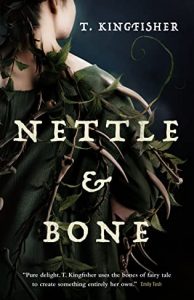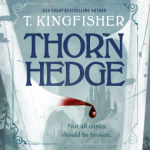 A Sorceress Comes to Call by T. Kingfisher
A Sorceress Comes to Call by T. Kingfisher Format: eARC
Source: supplied by publisher via Edelweiss
Formats available: hardcover, ebook, audiobook
Genres: Dark Fantasy, fairy tales, fantasy, horror, retellings
Pages: 336
Published by Tor Books on August 6, 2024
Purchasing Info: Author's Website, Publisher's Website, Amazon, Barnes & Noble, Kobo, Bookshop.org, Better World Books
Goodreads
A dark retelling of the Brothers Grimm's Goose Girl, rife with secrets, murder, and forbidden magic
Cordelia knows her mother is unusual. Their house doesn’t have any doors between rooms, and her mother doesn't allow Cordelia to have a single friend—unless you count Falada, her mother's beautiful white horse. The only time Cordelia feels truly free is on her daily rides with him. But more than simple eccentricity sets her mother apart. Other mothers don’t force their daughters to be silent and motionless for hours, sometimes days, on end. Other mothers aren’t sorcerers.
After a suspicious death in their small town, Cordelia’s mother insists they leave in the middle of the night, riding away on Falada’s sturdy back, leaving behind all Cordelia has ever known. They arrive at the remote country manor of a wealthy older man, the Squire, and his unwed sister, Hester. Cordelia’s mother intends to lure the Squire into marriage, and Cordelia knows this can only be bad news for the bumbling gentleman and his kind, intelligent sister.
Hester sees the way Cordelia shrinks away from her mother, how the young girl sits eerily still at dinner every night. Hester knows that to save her brother from bewitchment and to rescue the terrified Cordelia, she will have to face down a wicked witch of the worst kind.
My Review:
The name of that sorceress who comes to call on Hester Chatham and her brother the Squire is “DOOM!”.
That’s not what she was christened with – assuming she was christened at all. Or baptized or anything like that because she’s clearly evil. This evil has a name, and it’s Evangeline. She’s hoping to change that to Mrs. Squire, but in order to get her way she’ll have to get past the Squire’s sister, Hester.
Evil is sure that Hester will be a pushover – or she’ll simply push her over a balcony. After all, she’s done it before. She even does it right in front of Hester to one of Hester’s dearest friends.
But evil, as that saying goes, only triumphs when good men stand by and do nothing. Evil’s magic is such that most of the men, including the Squire, are quite literally standing by and doing nothing as she has utterly ensorcelled them – or at least the ones she thinks are important.
Seeing her friend die, watching her brother succumb to the sorceress’ seductive magic, discovering that the sorceress’ daughter is ANYTHING but her mother’s accomplice, spurs Hester to ACT. To do whatever she can and however she must in order to save her brother, her friends and even the sorceress’ desperate and despairing daughter.
All their lives hang in the teetering balance.
 Escape Rating A+: This wasn’t what I expected, although having read quite a bit of the author’s work, I probably should have. I also had zero recollection of the fairy tale the story is loosely based on (The Goose Girl if you’re curious too), and that didn’t matter a bit, although if the idea of that drives you bonkers there’s a summary in Wikipedia, which some Wikipedian needs to edit to include this book in the list of adaptations.
Escape Rating A+: This wasn’t what I expected, although having read quite a bit of the author’s work, I probably should have. I also had zero recollection of the fairy tale the story is loosely based on (The Goose Girl if you’re curious too), and that didn’t matter a bit, although if the idea of that drives you bonkers there’s a summary in Wikipedia, which some Wikipedian needs to edit to include this book in the list of adaptations.
Kingfisher writes both fantasy and horror and often in that mushy middle between the two. While this one is in that middle, it leans more to the fantasy side the way that the equally awesome (and award-winning!) Nettle and Bone did, rather than hewing closer to the horror side the way that her Sworn Soldier series (What Moves the Dead and What Feasts at Night) does.
Not that the acts that the sorceress commits are not plenty horrific – because they completely, utterly and absolutely are. But the way the story works its way out of her evil feels more like a fantasy. It also specifically feels a bit like a very specific fantasy, Miss Percy’s Pocket Guide to the Care and Feeding of British Dragons by Quenby Olson. I’m certain that Hester and Miss Percy would be the very best of friends – and would have PLENTY of common ground to talk about!
I certainly enjoyed both stories for the same reason, their marvelous middle-aged female protagonists who take terrible matters into their own hands – after a bit of quite reasonable and reasoning reluctance – in order to get the best of the evil bitch attempting to put them down so they can save the day.
 Which is when I felt like I got hit with a clue-by-four, to the point of chagrin that I didn’t figure out a whole bunch of things sooner. Not the way that Hester got the best of the sorceress, but rather the way that the story as a whole worked. And, as I mulled things over more than a bit, the way that Nettle and Bone and What Feasts at Night and a LOT of the author’s work, well, works.
Which is when I felt like I got hit with a clue-by-four, to the point of chagrin that I didn’t figure out a whole bunch of things sooner. Not the way that Hester got the best of the sorceress, but rather the way that the story as a whole worked. And, as I mulled things over more than a bit, the way that Nettle and Bone and What Feasts at Night and a LOT of the author’s work, well, works.
The stories are feminist by example rather than by hitting the reader over the head with feminism. They simply show that women are beyond capable of doing all the things that men do, including being insufferably and thoughtlessly and selfishly and unironically evil
Meanwhile, the male characters serve in secondary roles. You know what I mean, the roles that women normally fill. In this story, and now that I think of it in much of the author’s work, women fill the big parts and do the big things, while men are the assistants, the helpmeets, the love interests, the dupes, and the fools. They’re sidekicks. And even, as in the case of Hester’s brother the Squire, they can be TSTL.
Which he absolutely is. He’s just lucky that Hester absolutely is not.
The icing on the cake of this story is that the Squire merely gets a lucky escape, while Hester is the one who deserved and certainly earned a glorious happy ever after.




















